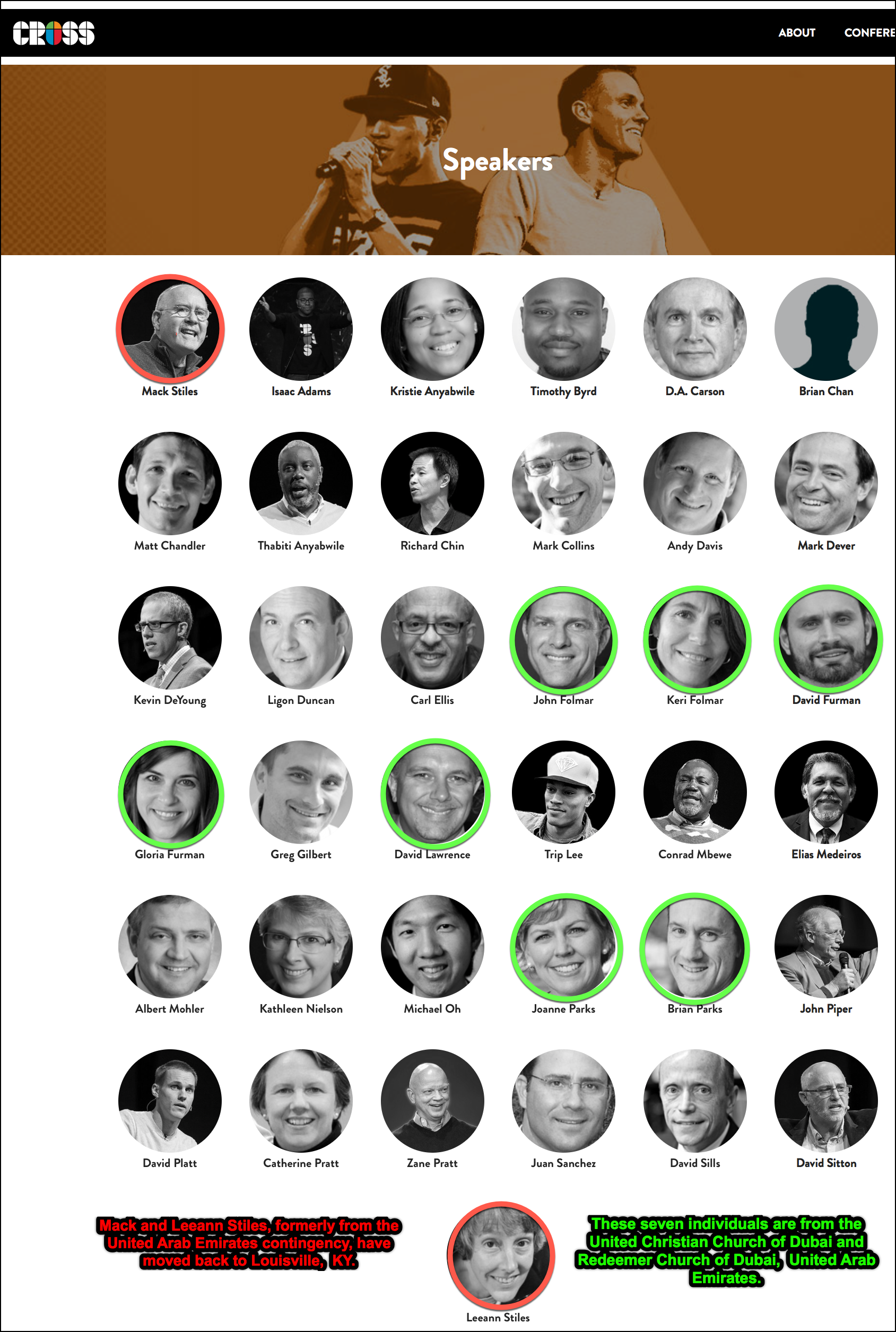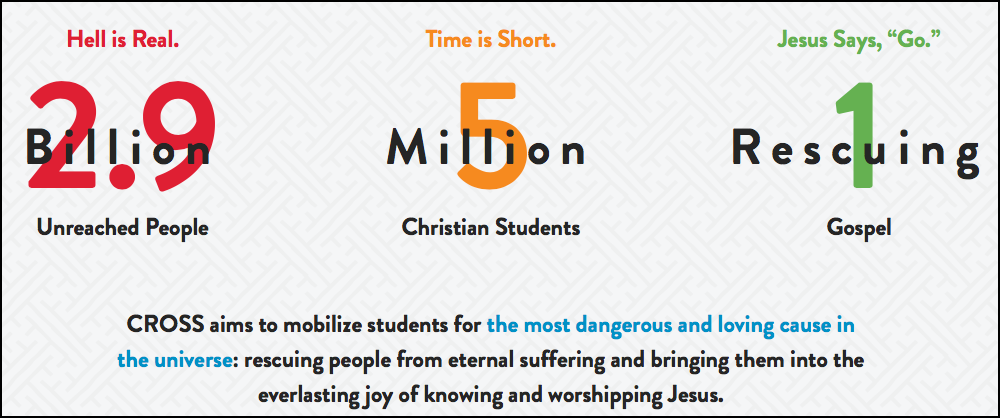


The 9Marx United Arab Emirates contingency will once again be home for Christmas! Yes, the frequent travelers will be the recipients of another all-expenses paid trip home; this time courtesy of radically idealistic college-aged youth (or their parents) who are willing to shell out the $160-$260 required entrance fee to attend the Cross Conference in Indianapolis, IN.

Led by John Piper and fellow “radical” conference icon David Platt, along with usual conference celebrities Kevin DeYoung, Matt Chandler, Thabiti Anyabwile, Mark Dever, Ligon Duncan, Albert Mohler and D.A. Carson, this conference will be an emotional appeal to recruit America’s Christianized youth to plant 9Marx churches in far off, dangerous locations such as Dubai.
“…there is no injustice in God. The injustice lies in Christians who possess the gospel and refuse to give their lives to making it known among those who haven’t heard..”
–David Platt, “Radical”
“This is the unavoidable conclusion to Matthew 10. To everyone wanting a safe, untroubled, comfortable life free from danger, stay away from Jesus. The danger in our lives will always increase in proportion to the depth of our relationship with Christ.”
-David Platt, “Radical”

We should admire the dedication of these speakers who are so willing to sacrificially take time away from their families to further the cause of spreading their 9Marx brand of the Americanized gospel. (Left unspoken is how much each speaker will receive from the conference entrance fees, but one can guess the amount is likely sufficient to retire any Christmas debt.)
Cynical, you ask?
“No one can serve two masters. Either you will hate the one and love the other, or you will be devoted to the one and despise the other. You cannot serve both God and money.” (Matthew 6:24, NIV)
In addition to the revenue generated from ticket sales, these conferences profit from the brisk sale of books which the speakers have authored. Additionally, they have official “sponsors.” This raises another serious question: how can an organization like IMB (the International Mission Board) which is wholly supported by donations from Southern Baptist church members, justify spending funds to sponsor a conference? How much does it cost an organization to become a sponsor of the Cross Conference? I have no idea, but I would think the price is significant. Need I remind you of the shaky financial status of the IMB?
By now many of you may have heard that last week, IMB announced a plan to reduce the total number of our personnel (both here and overseas) by 600-800 people over the next six months. This is certainly not an announcement that I, in any way, wanted to make. At the most recent meeting of the SBC in Columbus, I shared with messengers how IMB spent tens of millions more dollars than we received last year… we will have a similar shortfall this year, and we are projecting another shortfall of like magnitude next year. In fact, when we stepped back and looked at IMB finances since 2010, we realized that IMB has spent a combined $210 million more than people have given to us.
“Open letter from David Platt” by David Platt, September 4, 2015. (Link)

If I were a member of an SBC church, I would be asking some very pointed questions concerning what exactly my donations were being spent on. Unless I saw some major reforms I would seriously consider donating my money to another group. You may recall I have also written on the ERLC, another SBC funded group that members should check into. (Link)

The IMB is financially strapped. They have offered their missionaries early retirements in an attempt to get their budget under control. As the screen shot below indicates, Platt anticipated 600-800 missionaries and office staff would accept the offer to retire. He was surprised that 1,132 chose to retire and this caused further financial hardship for IMB.

Based on this information, it seems fiscally irresponsible for IMB to be spending money and effort to support the Cross Conference, a conference whose aims can be viewed in the screen shot below. Why would David Platt want to hire more missionaries when he has just paid 1,132 missionaries to leave the foreign mission field?

Another item that sends mixed messages and leaves me thoroughly confused is the quote below. This quote is from an article on the 9Marx web page written by Steve Jennings. Jennings is a pastor in Fujairah, UAE. (A city on the east coast of the UAE, 90 kilometers from Dubai.) Immanuel Church is a church plant sponsored by Redeemer Church of Dubai. Redeemer Church of Dubai is a church plant sponsored by United Christian Church of Dubai. The 7 particpants from the UAE in this Cross conference are from the latter two churches.
In the article Jennings makes a case for the fact that the USA is sending out too many missionaries! Jennings complains that many of these recruits are under-trained and unqualified, unfit for leadership in their American churches and thus, even more unqualified for mission work in a foreign country. I would disagree with the assumption that starting a church for expat Christians qualifies as reaching the unreached, or that you need to be an elder prior to moving to a foreign country, but that is what Jennings and his tribe believe. I therefore must ask the question, why then are you speaking at the Cross Conference? (Other than the obvious answer of it enables you to get a trip home for Christmas free of charge.)
The Great Commission is immense, and just like any immense task it requires vision, dedication, and a lot of manpower. That being said, there are many times when I want to stop and say to the Western church: “Stop sending them! Stop sending under-qualified missionaries!” To be sure, the workers are few, and the harvest is great. But that does not mean that more workers are necessarily better. It seems that the impatience that so marks the current generation has infiltrated the missionary movement under the guise of “urgency.” This impatience, rather than being curbed by church leaders, is often fostered and even encouraged.
“Stop Sending Missionaries: Why More Isn’t Always Better” by Steve Jennings, pastor of Immanuel Church of Fujairah in the United Arab Emirates. (Link)
Here is what I stated in a previous blog article, it is different from what Jennings states, but others who have spent time in the Middle East agree with me.
I think the closest comparison I have that American Evangelicals would understand would be attempting to convert Mormons. If you were to plant a church in Salt Lake City you would not have Mormons coming in droves to attend your church service. Even if you developed a friendship with a Mormon and he was attracted to Christianity it would be very hard for him to convert. Not only would he have to go against all he has been taught, but he would also have to give up all his family and social contacts. He would literally be ostracized from all his Mormon friends and family. Multiply this by about 100 for the difficulties a Muslim would face if he converted to Christianity. Muslims can be put to death for converting to another religion. In my opinion, the only way to share Christ with Muslims is through sincere friendships. These friendships can take years to cultivate. As with any person, when they see you have a genuine love and concern for them they will begin to trust you and open dialogues are possible. Even then you may never see any fruit from your efforts. This is why I question Jennings’ assertion that only extremely knowledgeable Christians able to teach, refute error, etc. should be coming to places such as Dubai. Phooey, I say. If you love the Lord and have a burden for Muslims, get a job in Dubai and move over here. Once here, intentionally seek a friendship with an Emirati. You may make only one such friend. That is enough.
If, after reading this, you are still intent on enriching the speakers above by paying the entrance fee, let me remind you that you will be able to view all the sessions for free shortly after the conference has concluded. Further, consider the following topics and ask yourself if you really need to spend your time and money listening to such matters:
Honor Thy Mother And Father – Afshin Ziafat
What About MY Issues? Debt, Pornography And Other Besetting Sins – Thabiti Anyabwile
What Are Pastor-Senders Looking For In Student-Goers? – Kevin DeYoung
Mobilizing Asians To Go To The Nations – Richard Chin
Show Me The Money! Raising Support – Byron Johnson
Wanted: Healthy Churches, Not Lone Rangers – John Folmar
My Spouse’s Call – Keri Folmar
Finally, below is a quote from one of my favorite authors. His is a voice of calm, rational thought and stands in stark contratst to the “radical” message Piper and Platt seem intent on spreading.
“For as long as I can remember I had been reading the letters to the churches in the New Testament and missing something. I missed it as a young man wanting to enter vocational ministry, and I missed it as a seminary student. I sadly missed it as a pastor. Sometimes we may miss things because they are hidden. But we seem to always miss much because we see it every day.
I missed the obvious: the Apostles are writing to normal people. Most of them are nameless. They are Jew and Gentile, yes. But they are also not apostles. And most are not pastors. They are carpenters, farmers, traders, sailors, fisherman, shepherds, guards. They are mothers and fathers and children. Compared to the life of an apostle, their lives are probably mundane. These are ordinary men and women believing an extraordinary story. They are not the Apostle Paul, or Peter, or any of the other apostles, who are immortalized in the pages of sacred writ. They are ordinary people who huddled in someone’s home, drank their wine, ate their bread, and listened to the Holy Spirit through the words of an Apostle. And then they went home. And they got up the next morning and lived a normal life, probably to the end of their days. And now, poof! They are forgotten.
My guess? Most of them lived out the rest of their lives after coming to faith with the most exciting thing in their lives being when they believed and aligned themselves with Christ and his people. They kept on living where they were and making a living as they did before they believed. They lived normal lives. Only more so. They listened to Paul’s teaching, learned from him, and in faith stayed where they were after he left. All of this should have been obvious to me but it wasn’t. For years I read and thought and then taught as if Paul was the standard for those I was teaching. “Look at Paul and his singular devotion to Christ,” I would implore them. And then it hit me. The nameless, ordinary believer who listened to Paul and lived faithfully as a farmer, mother, etc., right where they were — they are the standard. The forgotten mundane existence of those whose names we will never know is the endgame.
It is true Paul says to his readers, “imitate me…” And he says it more than once. In each instance, Paul wants his readers to see that he is an example of what he is asking of them in that particular context. His life is consistent with what he is teaching. He isn’t out of step. But he never asks them to stop being who they are. He never challenges them to go anywhere. We don’t even get hints that lead us to believe he is making them feel guilty for living in comparative comfort compared to his lack of it. That’s weird. And it’s weird because this is so common in our pulpits and in conferences held for zealous college students.
So many pastors today, famous ones and otherwise, are asking young people and everyone else if they are willing to give it all and go overseas as a missionary. It’s not a bad question to ask. There is no question in my mind that this question needs to be out there. But they — or someone — also needs to ask, “are you willing to be numbered among the nameless believers in history who lived in obscurity? Do you have the courage to be forgotten by everyone but God and the heavenly host? Are you willing to be found only by God as faithful right where you are? Are you willing to have no one write a book about you and what you did in the name of Christ? Are you willing to live and believe — in stark contrast to the world around you — there is a God of the mundane?”
-Matt B. Redmond, “The God of the Mundane: Reflections on Ordinary Life for Ordinary People”